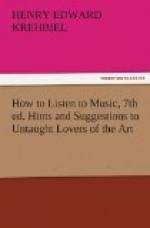[Sidenote: Predecessors of Wagner.]
[Sidenote: Old operatic distinctions.]
[Sidenote: Opera buffa.]
[Sidenote: Opera seria.]
[Sidenote: Recitative.]
Detailed study of the progress of opera from the first efforts of the Florentines to Wagner’s dramas would carry us too far afield to serve the purposes of this book. My aim is to fix the attitude proper, or at least useful, to the opera audience of to-day. The excursion into history which I have made has but the purpose to give the art-form a reputable standing in court, and to explain the motives which prompted the revolution accomplished by Wagner. As to the elements which compose an opera, only those need particular attention which are illustrated in the current repertory. Unlike the opera audiences of two centuries ago, we are not required to distinguish carefully between the various styles of opera in order to understand why the composer adopted a particular manner, and certain fixed forms in each. The old distinctions between Opera seria, Opera buffa, and Opera semiseria perplex us no more. Only because of the perversion of the time-honored Italian epithet buffa by the French mongrel Opera bouffe is it necessary to explain that the classic Opera buffa was a polite comedy, whose musical integument did not of necessity differ from that of Opera seria except in this—that the dialogue was carried on in “dry” recitative (recitativo secco, or parlante) in the former, and a more measured declamation with orchestral accompaniment (recitativo stromentato) in the latter. So far as subject-matter was concerned the classic distinction between tragedy and comedy served. The dry recitative was supported by chords played by a double-bass and harpsichord or pianoforte. In London, at a later period, for reasons of doubtful validity, these chords came to be played on a double-bass and violoncello, as we occasionally hear them to-day.
[Sidenote: Opera semiseria.]
[Sidenote: "Don Giovanni."]
Shakespeare has taught us to accept an infusion of the comic element in plays of a serious cast, but Shakespeare was an innovator, a Romanticist, and, measured by old standards, his dramas are irregular. The Italians, who followed classic models, for a reason amply explained by the genesis of the art-form, rigorously excluded comedy from serious operas, except as intermezzi, until they hit upon a third classification, which they called Opera semiseria, in which a serious subject was enlivened with comic episodes. Our dramatic tastes being grounded in Shakespeare, we should be inclined to put down “Don Giovanni” as a musical tragedy; or, haunted by the Italian terminology, as Opera semiseria; but Mozart calls it Opera buffa, more in deference to the librettist’s work, I fancy, than his own, for, as I have suggested elsewhere,[E] the musician’s imagination in the fire of composition went far beyond the conventional fancy of the librettist in the finale of that most wonderful work.




